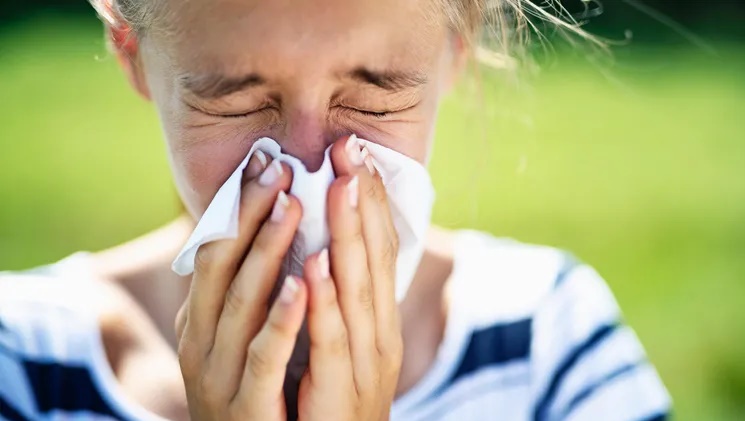These home remedies really help against hay fever

When it comes to hay fever, many swear by home remedies such as ginger, honey, apple cider vinegar or steam baths. But does that do anything at all?
When nature blooms and turns green in spring, it is a beautiful sight for many – but often a nightmare for people with hay fever. The pollen, which mainly flies on warm and dry days, triggers an allergic reaction in the upper respiratory tract. This means: They sneeze frequently, their nose runs or is blocked and some of those affected have watery and itchy eyes.
Recommendations for various home remedies to help with hay fever are circulating on the Internet: from steam baths to apple cider vinegar and honey to ginger and eyebright. You can find out here which of these have also proven to be effective in clinical studies.
Are steam baths a good home remedy for hay fever?
Some people find steam baths helpful when their nose is runny or stuffy. However, the effect of breathing in (inhaling) water vapor on hay fever has not been adequately scientifically proven.
So far there is only one study that has dealt with this connection. The results suggest that steam baths can relieve hay fever symptoms such as sneezing. However, the study has methodological flaws and only a few people took part. A clear recommendation for or against steam baths is therefore not possible.
If you still want to try out whether the steam bath relieves your hay fever symptoms, you should consider a few points:
Use hot but not boiling water to avoid burning yourself.
Inhalation is generally not recommended in the case of skin inflammation, eye problems, low blood pressure or other circulatory problems.
You should refrain from additives such as essential oils, as these substances can also trigger allergic reactions.
To prepare it, fill a large pot with hot water, put a towel over your head and bend over the pot. Keep a distance of two hands. Breathe in the water vapor deeply through your nose and mouth for 10 to 20 minutes, then wash your face with lukewarm water. Avoid drafts after the steam bath.
Are apple cider vinegar and honey effective home remedies for hay fever?
Apple cider vinegar is often recommended for hay fever. Advice pages talk about a glass of water with two tablespoons of apple cider vinegar and a little honey if necessary.
Apple cider vinegar contains so-called polyphenols. These are substances that are typically found in fruits, vegetables, wine, tea and cocoa. Clinical studies have shown that apple polyphenols relieve various hay fever symptoms. Study participants who drank a drink with apple polyphenols every day had fewer sneezing attacks, less runny noses and less swollen nasal conchae.
However, the amount of apple polyphenols they received was very high compared to the amount found in commercial apple cider vinegar. Therefore, no clear recommendation for use as a home remedy can be derived from the study. However, it is entirely possible that apple cider vinegar improves hay fever symptoms, at least to a small degree.
Honey, which can be mixed into a glass of water with apple cider vinegar, is also often said to have a soothing effect on hay fever. However, the study situation is rather contradictory. The results of a study suggest that honey in combination with a special drug against allergic symptoms – an antiallergic – can also improve the symptoms. However, there is no scientific consensus as to whether honey alone helps with hay fever.
Does ginger help with hay fever?
Various advice sites on the Internet recommend ginger tea or ginger lemonade for hay fever. But even this recommendation has not yet been conclusively scientifically proven.
There is only one study that took a closer look at this connection. Half of the participants were treated with ginger (in the form of highly concentrated tablets) and the other half with a common anti-allergy drug. According to the study, the symptoms of both groups decreased equally over a period of six weeks. However, there is a need to further investigate the link between ginger and hay fever scientifically, as only a few people took part in the study.
But even if the results of the study are confirmed further, the question remains whether tea or lemonade made from ginger can have a similar effect as highly concentrated ginger extract in tablet form.
Is eyebright a suitable home remedy for hay fever?
If you believe the promises of some websites, the plant eyebright (technically: Euphrasia officinalis) is an all-purpose remedy for everything from coughs to conjunctivitis to hay fever. Eyebright is available as an ingredient in eye drops and is said to be good as a homemade decoction as a nasal rinse or eye mask.
However, there is no scientific evidence that eyebright helps with the diseases listed, including hay fever.
What helps against hay fever with a stuffy nose?
One possible symptom of hay fever is a stuffy nose. Saline nasal sprays and nasal douches can help against this. The latter rinse the nasal mucosa with a saline liquid, which, for example, expels dust and pollen. Various clinical studies suggest that this has a positive effect on hay fever, but there is not enough data for a clear recommendation.
Nasal douches and the saline solution that goes with them are available at pharmacies and drugstores. Pay close attention to the instructions for use when using.
What helps immediately against hay fever?
If you want to get rid of annoying hay fever symptoms such as sneezing and watery eyes quickly, you should not necessarily rely on home remedies. Their effect usually occurs more slowly and is not particularly long-lasting.
However, what can provide quick relief are antihistamines. These drugs suppress the messenger substance histamine so that it can trigger fewer allergic reactions. In tablet form, antihistamines work within the first hour, and as a nasal spray even within 15 minutes. Some get tired from the pills or get a headache. Nasal sprays can cause a bitter taste in the mouth.
Before taking an antihistamine, however, you should consult a doctor. This is the only way to determine which drug will work best in your case.
What to do if you have a very severe allergy?
Hay fever symptoms can vary in severity. Home remedies are not advisable for severe allergic reactions such as conjunctivitis, itching, coughing, wheezing and shortness of breath. In some cases, even medication is no longer sufficient. So that it doesn’t get that far, there is a so-called hyposensitization.
With this type of treatment, the immune system gradually gets used to the trigger of hay fever, which can improve the symptoms in the long term. Desensitization lasts about three years. It is already possible in the first year of treatment that the urge to sneeze, stuffy nose and itchy eyes subside.
If you have severe hay fever, it also makes sense to reduce contact with pollen. If you know when the pollen that triggers your symptoms occurs, you can possibly plan a holiday trip to areas with fewer pollen for this time. The German Weather Service offers a constantly updated map that predicts the pollen count up to two days in advance.
If you cannot avoid high levels of pollen, it is advisable to keep the windows closed if possible and only air them in the morning or evening when few pollen fly. You can also attach special pollen screens that catch most of the pollen.
It is also advisable to damp mop more frequently as pollen dust collects on the floor and furniture. Also helpful: Change your clothes shortly after entering the house, do not leave clothes you have worn outside in the bedroom and wash your hair before going to bed.
Can hay fever go away on its own?
There are certainly allergies that can improve with age, as the immune system becomes more sluggish and no longer reacts so strongly to allergy triggers. However, this is not the case with hay fever. On the contrary: over time, a pollen allergy can spread to more and more pollen and even to different foods.
In addition, allergic asthma can develop from hay fever, which is manifested by coughing and shortness of breath. The risk of pollen allergies getting worse is particularly high if those affected do not treat them or treat them insufficiently – for example only with home remedies. However, timely and appropriate treatment can reduce this risk.
Conclusion: home remedies – yes or no?
Home remedies are usually only suitable for hay fever as a supplement to medication. If the disease is not treated in time and adequately, it can spread from the nose to the lower respiratory tract and worsen the symptoms even more. If you have hay fever symptoms, you should always consult a doctor first.


